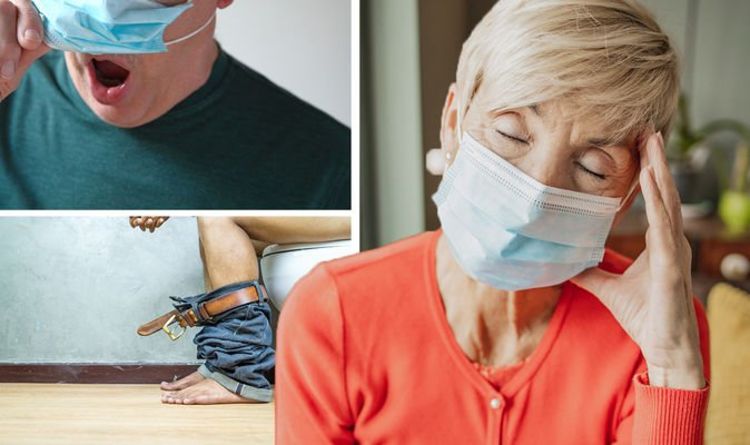
The UK now has not one but two new mutations of coronavirus circulating in its shores after a handful of people tested positive for the South African variant. The government is rolling out household coronavirus testing across England to assess the prevalence of the new strain. While there is no evidence the South Africa variant is more deadly than its predecessor, it is more transmissible and contains a mutation that could allow the virus to elude some of the antibodies produced through vaccines.
Until researchers ascertain more specific characteristics about the South Africa strain, it is vital that you heed the warning signs of coronavirus by self-isolating.
Although there has been a lot of focus on the three ‘classic’ symptoms of COVID-19 – persistent cough, fever and loss of smell (anosmia) – data published by the ZOE COVID Symptom Study app reveals at least 15 symptoms of the disease.
The health app monitors the symptoms and spread of COVID-19 through the daily health reports logged by millions of users.
It recently logged 15 possible symptoms:
- Loss of smell (anosmia)
- High temperature (fever)
- Persistent cough
- Severe tiredness (fatigue)
- Headache
- Abdominal pain
- Chest pain
- Sore throat
- Severe shortness of breath
- Skipping meals
- Muscle pains
- Hoarse voice
- New confusion (delirium)
- Diarrhoea
- Skin rash.
READ MORE: Is the South African variant of Covid more deadly?
Clinical research conducted by colleagues at King’s College London, led by Dr Claire Steves, used the data to identify who is most likely to end up severely ill in hospital with COVID-19, requiring oxygen and other treatments, at just the fifth day into their illness.
Dr Steves and her team have found that counting up the number of symptoms experienced over the first five days of illness, along with sex and age, could be used to predict whether someone is likely to end up in needing oxygen support in hospital.
They found, for example, a 50-year-old man with just two symptoms in their first week, then their chance of needing hospital treatment was low (less than 25 percent).
But a 60-year-old woman with 10 different symptoms in their first week, then they were at very high risk, with a more than 75 percent chance of needing oxygen later on.
DON’T MISS
Covid new strain warning: Most ‘unnoticeable’ sign [INSIGHT]
Vitamin D deficiency symptoms: ‘Unusual’ signs of deficiency [ADVICE]
Diabetes symptoms: Sign in your wee of high blood sugar [TIPS]
South Africa variant – what we know so far
On December 18, national authorities in South Africa announced the detection of a new variant of SARS-CoV-2.
The variant has now been identified in the UK with no links to travel.
In response, 80,000 people in England will be offered urgent tests.
Residents aged 16 and over in eight areas across Surrey, London, Kent, Hertfordshire, Southport and Walsall are being asked to take tests, regardless of symptoms.
In a Downing Street news conference earlier today, Matt Hancock said that there was “currently no evidence” to suggest the South African variant was “any more severe, but we need to come down on it hard, and we will”.
The neighbourhoods being targeted for testing are:
- W7, N17 and CR4 in London
- WS2 in Walsall
- ME15 in Maidstone, Kent
- PR9 in Southport
- EN10 in Broxbourne, Hertfordshire
- GU21 in Woking.
In a direct address to those living people in these postcodes, Mr Hancock said: “It is imperative that you stay at home, and that you get a test, even if you don’t have symptoms.
“This is so important so that we can break the chains of the transmission of this new variant, and we’ve got to bring this virus to heel.”
Prof Adam Finn, a member of the Joint Committee on Vaccination and Immunisation (JCVI), underlined the point when he said a “real effort” should be made to try to “eliminate” the South African variant before it took hold.
Prof Jim McManus, the director of public health for Hertfordshire, said if every single case was detected, it might be “possible” to eradicate the variant within two weeks.
He warned that officials “may find this has spread beyond that, so it may take three weeks or more, but we will give this everything we have got,” he told the BBC.
The news comes as almost 9.3 million people in the UK have now received a first dose of a coronavirus vaccine, according to the latest government figures.
Published at Mon, 01 Feb 2021 18:11:31 +0000
South Africa variant symptoms: The full list of possible warning signs to watch out for













